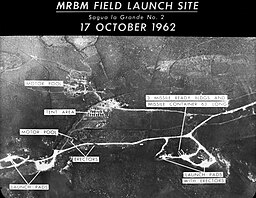Brinkmanship
This article has multiple issues. Please help improve it or discuss these issues on the talk page. (Learn how and when to remove these messages)
No issues specified. Please specify issues, or remove this template. |

Brinkmanship is the practice of pushing a dangerous situation to the verge of disaster in order to achieve the most advantageous outcome. It occurs in international politics, foreign policy, labour relations, poker, and (in contemporary settings) military strategy involving the threatened use of nuclear weapons.
This maneuver of pushing a situation to the brink succeeds by forcing the opposition to back down and make concessions. This might be achieved through diplomatic maneuvers by creating the impression that one is willing to use extreme methods rather than concede. During the Cold War, the threat of nuclear force was often used as such an escalating measure. Adolf Hitler also instituted brinkmanship conspicuously during his rise to power.
Origins
Brinkmanship is the ostensible escalation of threats in order to achieve one's aims. Originally the term brinkmanship was coined by Secretary of State John Foster Dulles under the Eisenhower administration, during the Cold War. Eventually, the threats involved might become so huge as to be unmanageable at which point both sides are likely to back down. This was the case during the Cold War, as the escalation of threats of nuclear war is mutually suicidal.
Dangers
The dangers of brinkmanship as a political or diplomatic tool can be understood as a slippery slope: In order for brinkmanship to be effective, the threats used are continuously escalated. However, a threat is not worth anything unless it is credible; at some point, the aggressive party may have to back up its claim to prove its commitment to action.
The chance of things sliding out of control is also often used as a tool of brinkmanship, because it can provide credibility to an otherwise incredible threat. The Cuban Missile Crisis presents an example in which opposing leaders, namely John F. Kennedy and Nikita Kruschev, continually issued warning, with increasing force, about impending nuclear exchanges, without necessarily validating their statements. Pioneering game theorist Thomas Schelling called this "the threat that leaves something to chance."[1]
The British intellectual Bertrand Russell compared nuclear brinkmanship to the game of chicken.[2] The principle between the two is the same, to create immense pressure in a situation until one person or party backs down.
See also
References
- ^ Schelling, Thomas, The Strategy of Conflict, copyright 1960, 1980, Harvard University Press, ISBN 0674840313.
- ^ Russell, Bertrand W. (1959) Common Sense and Nuclear Warfare London: George Allen & Unwin, p30: "Since the nuclear stalemate became apparent, the governments of East and West have adopted the policy which Mr. Dulles calls 'brinksmanship.' This is a policy adapted from a sport which, I am told, is practiced by some youthful degenerates. This sport is called 'Chicken!'"
External links
- An analysis of brinkmanship tactics used during the Cuban missile crisis
- Tongil Korea Net: Ridiculous Are Western Media’s Talk about DPRK’s “Brinkmanship Tactics” Commentary by Korean Central News Agency, February 22, 2003.
